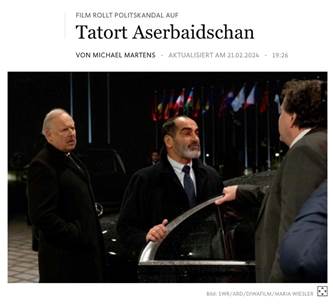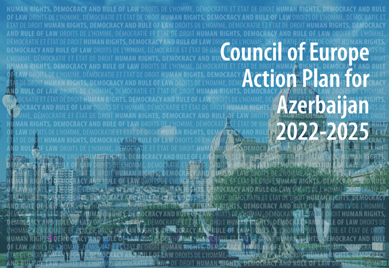Azerbaijan thriller – Political prisoners and how to recover the soul of the Council of Europe
- Why the Council of Europe matters
- Human rights, European security and blackmail
- A thriller, a documentary and the real story
- A happy end? No.
- Repression in Azerbaijan intensifies …
- … PACE acts …
- … the Secretariat declares that “black is white” …
- … and member states are silent.
- Breaking the silence
Dear friends of ESI,
On Tuesday, 20 February, a large audience gathered in the German Bundestag to watch the premier of a thriller – Am Abgrund (On the edge). The film was inspired by the unbelievable true story of caviar diplomacy, Azerbaijan’s decades-long effort to corrupt dozens of parliamentarians across Europe, with a particular focus on members of the Parliamentary Assembly of the Council of Europe (PACE).
On Wednesday, 6 March, the film was shown by the German public broadcaster ARD. It was followed by a documentary on the same scandal, one many consider the biggest in the Council of Europe’s history:
Online: A thriller set in Azerbaijan and the Council of Europe
ARD documentary: corruption and Caviar Diplomacy

Assassination of an investigative journalist in Malta
The two films capture how the leading human rights institution on the European continent sold its soul. But their common message is not about events that happened long ago. It is about whether today European democrats will make the necessary effort to defend the European Convention on Human Rights (ECHR).
The central mission of the Council of Europe is to nurture and protect the ECHR. In recent decades, it has often failed. Nowhere is this clearer than in the smart, aggressive and well-resourced campaign by the carbon-autocracy of Azerbaijan, supported by Russia. Ten years ago, as Russia launched its war on Ukraine and Azerbaijan took over the Council of Europe’s rotating chairmanship in 2014, the Council of Europe hit rock bottom. It had begun to harm, not help, the cause of human rights.
The question today is how the Council of Europe might win back its soul and play the role it was created for 75 years ago. On this, ESI has produced a new background document:
ESI Background paper
The next war in the Caucasus
Taking Ilham Aliyev seriously
Why the Council of Europe matters
The Council of Europe was created with high hopes in London in April 1949. It was the height of the early Cold War. Both the parliamentarians (PACE) and the governments of member states (the Committee of Ministers) met for the first time in Strasbourg in August 1949. There, war-hero Winston Churchill was celebrated by huge crowds as the Council of Europe’s spiritual father.
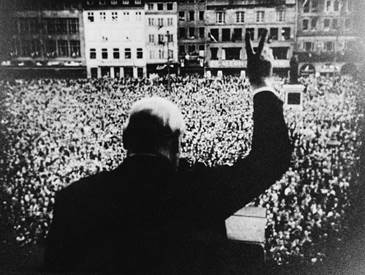
When the Council of Europe evoked enthusiasm:
Churchill in Strasburg, August 1949
There were then 12 members. Today there are 46. The last European democracy still outside, Kosovo, has moved close in the past week to joining, with the responsible PACE committee recommending its accession by a majority of 31 to 4. This would leave only three of Europe’s 50 states outside: Vatican City state (Europe’s last absolute monarchy); Belarus (a dictatorship with the death penalty); and Russia, which was expelled from the Council of Europe following its full-scale invasion of Ukraine in 2022.
The lived experience of the Council’s founders in 1949 was that regimes who rule through violence against their own citizens are very likely to turn their aggression outwards before long. As one of the drafters of the European Convention on Human Rights, French resistance member Pierre Henri Teitgen, put it in Strasbourg in August 1949:
„… democracies do not become Nazi countries in one day … One by one, freedoms are supressed, in one sphere after another … It is necessary to intervene before it is too late. A conscience must exist somewhere which will sound the alarm to the minds of a nation menaced by this progressive corruption.“
Teitgen then referred explicitly to the experience of Italy in the 1920s. Fascist Italy remained a member of the League of Nations despite the brutal violence committed under Mussolini against Italians. One hundred years ago, in 1924, leading opposition politician Giacomo Matteotti was kidnapped, tortured and killed by fascists in Rome. All opposition in Italy was suppressed, all democratic rights abolished. A dangerous precedent was set, which others in Europe would copy.
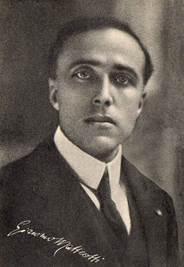
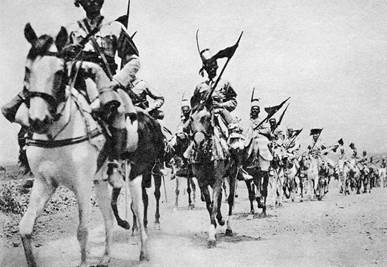
Matteotti, murdered in Rome in 1924 –
Mussolini’s troops attacking Abyssinia in 1935
By the time Italy withdrew from the League of Nations in 1937, Mussolini had crushed all internal opposition, imprisoning, exiling or murdering them. He had turned his gaze abroad. In 1935, his troops attacked the only African member of the League of Nations, Abyssinia (modern-day Ethiopia), using poison gas and committing horrific atrocities. In 1936, Italy joined Nazi-Germany in providing military support to Franco’s coup in Spain. In November 1936, Mussolini announced his alliance with Hitler. Italy was getting ready to join Nazi-Germany in attacks on other European nations: war against Albania, Greece, France followed.
The League of Nations had failed and would not recover. The Council of Europe, open only to democracies when it was set up in 1949, was supposed to do better.
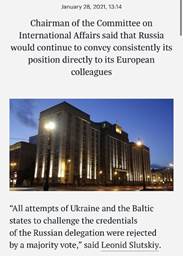
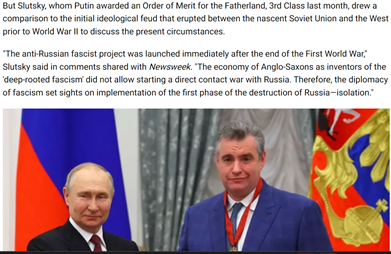
Leonid Slutsky on PACE 2021 and in Moscow in 2023
Human rights, European security and blackmail
Reacting to systemic human rights abuses is a matter of European security. Alas, this lesson had been forgotten in the past two decades in the Council of Europe.
The Council of Europe did not react when Putin’s Russia sent troops to Georgia, a Council of Europe member, in 2008. Nor when Boris Nemtsov was killed in front of the Kremlin in 2015. Nor when Russian agents tried to kill Alexey Navalny in 2020. When Russia forcibly annexed Crimea and then invaded Eastern Ukraine’s Donbas region in 2014, only PACE reacted and suspended its voting rights. And then, instead of the Council of Europe putting pressure on Russia, Russia put pressure on the Council of Europe.
In October 2016, Leonid Slutsky, Chairman of the International Affairs Committee of the Russian Duma, insisted: “Russia will return [to PACE] only if certain decisions are changed.” In summer 2017, Russia resorted to financial blackmail, refusing to pay its contribution to the organisation “until full and unconditional restoration of the credentials of the delegation.” In 2018, it dictated its terms: Russia would only return to PACE, and pay its outstanding fees, if the Assembly changed its rules to make it harder to remove credentials ever again. Otherwise, it threatened to leave the organisation altogether. The Council of Europe changed its rules. Leonid Slutksy celebrated this in 2021 as a diplomatic defeat of Ukraine and the Baltic states.
The rest is known. Russia, with its delegation back in PACE, sent Alexey Navalny to a penal colony. It continued to ignore all judgements by the European Court of Human Rights. It used even more violence to suppress critics across Russia. It rolled back its few remaining civic liberties. It moved against its most well-respected human rights organisation, Memorial. It prepared the ground for a full-scale invasion of Ukraine. This invasion has become the bloodiest war in Europe since the Council of Europe’s founding in 1949. By the time Russia was finally suspended and expelled, massive harm had been done.
In this tragedy, the Council of Europe mattered. Autocrats captured and silenced it. They used their membership as a cover for dismantling human rights at home and preparing wars of aggression abroad. They did not want anyone to sound an alarm. They got away with it.
And today, the regime in Baku tries the same playbook again, confident that it will work once more.

Huge interest in corruption and the Council of Europe in Germany
A thriller, a documentary and the real story
In the thriller On the edge, Gerd, a German member of the Bundestag and PACE from the Ruhr region, stumbles across a major corruption scandal. A historic vote in PACE on political prisoners reveals that a big majority of members vote in defence of the regime in Baku. The film shows Gerd beginning to realise that the bizarre behaviour of so many of his co-parliamentarians – who lie about human rights abuses and stolen elections without any shame – is in large part explained by a massive corruption campaign. Meanwhile in Azerbaijan, those who oppose the regime end up in jail, are blackmailed with sex tapes or attacked. An investigative journalist from Malta, who investigates corrupt links between Baku and politicians in her country, is assassinated in her car. In the end, Gerd challenges the PACE leadership, and German parliamentarians suspected of corruption are arrested.
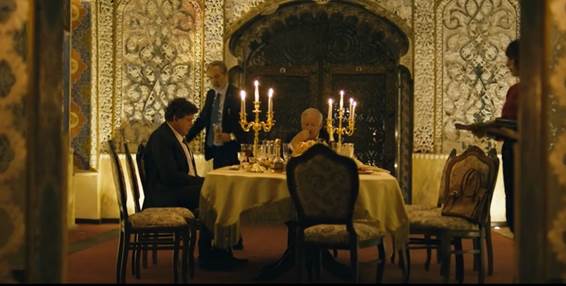
Thriller: PACE members on election observation hosted in Baku
This thriller is based on the real story of Caviar Diplomacy: Baku’s corrupt policy over more than two decades. Its exposure in late 2016 culminated in the September 2017 fall of Pedro Agramunt, the pro-Aliyev Spanish PACE president.
The disastrous vote on political prisoners did take place (in 2013). There were sex tapes to blackmail journalists in Baku. There was also a real Gerd, a parliamentarian from the Ruhr who played a key role in overcoming caviar diplomacy: Frank Schwabe, a Social Democrat member of the Bundestag and of PACE.
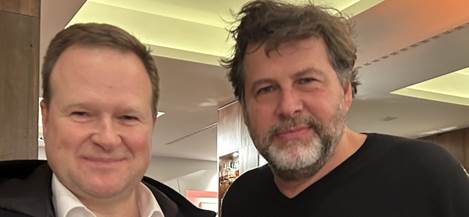
Reality and Fiction –
Frank Schwabe and the actor who plays Gerd, Berlin 2024
ESI’s investigation of caviar diplomacy began in 2011 and produced more than twenty reports by the end of 2017. It provided analyses both to Italian prosecutors in Milan – who started investigating an Italian PACE member to whom huge sums of money had been transferred from Baku via shell companies just before a vote on political prisoners in 2013 – and to Schwabe and his allies in PACE, such as the Christian-Democrat Pieter Omtzigt from the Netherlands. Early 2017 saw a concerted push for the resignation of the worst apologists of the Aliyev regime in PACE. An official investigation followed. A Maltese journalist, the courageous Daphne Caruana Galizia, who investigated corruption linked to Baku in Malta, was killed there with a car bomb in 2017. Pieter Omtzigt also investigated this for PACE.
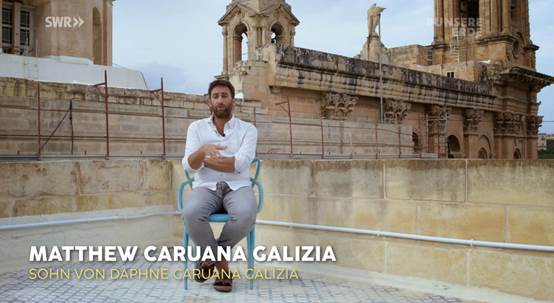
Documentary Am Abgrund:
interview with the son of journalist Caruana Galizia
The ARD documentary, which accompanies the thriller, tells this story. It includes footage of the shameful vote of January 2013. It also shows how the capture of PACE by Aliyev apologists was eventually reversed. It concludes with another historic vote in PACE in January 2024 when, following a proposal by Frank Schwabe and supported by a huge majority of members voting, the Azerbaijani delegation was expelled from PACE for their country’s blatant violations of all Council of Europe standards. One week later, in January 2024, prosecutors in Munich announced that they would press charges against prominent former German PACE members for having accepted Baku’s money.

Am Abgrund: Meeting in Strasbourg on how to
push back against PACE corruption, January 2017
Whenever it does its job, the Council of Europe remains the best instrument in Europe to identify systemic human rights abuses. Four institutions are key:
- the Parliamentary Assembly (PACE) and its rapporteurs and committees.
- the European Court of Human Rights (ECtHR), its judges elected by PACE.
- the Secretary General, elected by PACE every five years; and
- the Committee of Ministers, in which the government of every member state is represented. It is responsible for ensuring that ECtHR judgements are implemented and the institution’s standards protected.
PACE is the democratic heart of the institution. It has 324 members from 46 parliaments. Ten years ago, it was dominated by Azerbaijan apologists. PACE election observer missions praised fraudulent stolen elections as free and fair. PACE rapporteurs on Azerbaijan were mostly apologists for the regime. Votes in PACE on Azerbaijan had bizarre outcomes. And PACE members were regularly invited to expensive hotels, showered with gifts, some receiving significant amounts of money. But after 2017, PACE has changed dramatically. It has returned to playing the role it is designed to play. It is interesting to understand how.
During the January 2013 debate on political prisoners in Azerbaijan, 79 members of PACE voted that Azerbaijan should release political prisoners. These 79 were on the right side of history. Early this year, in January 2024, 76 members of PACE voted that because of violations of all Council of Europe standards the Azerbaijani delegation should be shown the door. The difference between these two debates was not the number of MPs who cared about human rights. It was the number of those who no longer stood up to justify Azerbaijan’s repression in public.
In January 2013, 125 members of PACE voted to shield the Baku regime from criticism. In January 2024, only 10 members did so: 9 from Turkey, Azerbaijan’s closest ally, and one from Albania. In 2024, very few PACE members dared to use the Orwellian newspeak of the past, declaring that Azerbaijan was still a “young democracy” that “needed more time”, that “every member has problems, so none should be singled out” or, simply, that when it comes to human rights in Azerbaijan, black is white.
Who voted with Aliyev in PACE? 2013 vs. 2024
Azerbaijan debacle: The PACE debate on 23 January 2013
Azerbaijan breakthrough – A historic PACE debate January 2024
A happy end? No.
But does this story of grand corruption, repression and crime, of corrupt and honest parliamentarians, finally have a happy ending? Alas, no. Not in Baku and not in Strasbourg.
There is more to the Council of Europe than PACE, and the other key pillars of the system have not changed their behaviour since 2014. Today, Baku pins its hopes on the General Secretariat and on member states in the Committee of Ministers, expecting that it will succeed once again in getting the Council of Europe to declare that, indeed, black is white.
Repression in Azerbaijan intensifies …
In autumn 2023, Anne Hidalgo, the mayor or Paris, invited hundreds of people to Paris City Hall to discuss the film Caviar Connection (2021). On the panel, with the mayor and the film makers, was a popular Azerbaijani blogger, Mahammad Mirzali.
Trailer of Caviar Connection (2021)
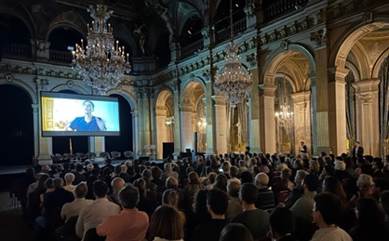
October 2023 – film and debate on Caviar Diplomacy in Paris City Hall
His story illustrates the brutality of the regime. Mirzali was first arrested and tortured in Azerbaijan in 2013. In 2016 he fled to France, where he was granted asylum. Since 2020, there have been three attempts on his life in France. The first took place in 2020, when he was shot and wounded in his car. The second took place in March 2021 in Nantes, where he was stabbed multiple times. Four men – three of them born in Azerbaijan and one born in Georgia – were arrested in connection with this attack. They were charged with “attempted murder by an organised gang.” The third attempt on Mirzali’s life was intercepted in June 2022:
“French police arrested the two suspected hit men on 12 June at a motorway toll near Angers, 90 km east of Nantes, the northwestern city where Mahammad Mirzali – a fierce critic of Azerbaijani President Ilham Aliyev – now lives. One was an Azerbaijani, who was armed with a pistol. The other was a Moldovan of Turkish origin. Both were driving Polish-registered cars and both had Mirzali’s address as their destination in their GPS devices. One also had a photo of Mirzali in his telephone.”
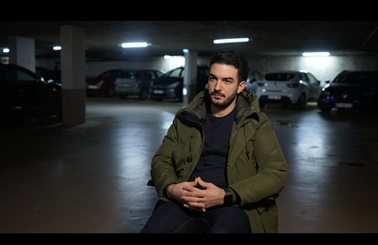

Blogger Muhammad Mirzali
The Aliyev regime goes to great lengths to pursue its critics around the world. It is as ruthless at home, with arbitrary arrests, blackmail and inhumane treatment. The number of political prisoners continues to grow. Leyla Yunus, a former political prisoner, who was arrested during the annus horribilis 2014, maintains the best list of political prisoners in Azerbaijan, which is updated regularly. These lists show a dramatic trend:
Yunus lists of political prisoners
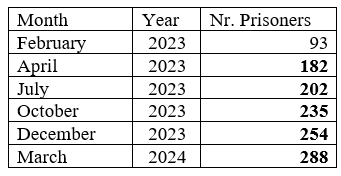
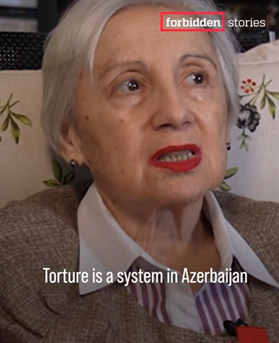
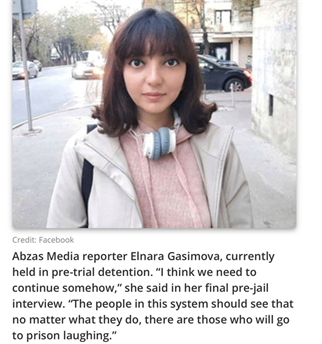
Leyla, a political prisoner in 2014 – Elnara, a political prisoner in 2024
Recent arrests include:
In December 2022: regime critic Bakhtiyar Hajiyev is arrested (again), charged with hooliganism and disrespect for courts. He is deprived of sleep, kept in a cell without heating and forced to sleep on the floor in unsanitary conditions.
In July 2023: economist and opposition activist Gubad Ibadoglu is arrested. Just two days before his arrest, Gubad shared an article he had written on the EU-Azerbaijani gas deal in 2022. There, he notes that Azerbaijan does not have the gas reserves it claims to have for the deal and is likely planning on reexporting Russian gas to the EU. He is charged with “manufacturing and selling counterfeit money.” In prison, he is denied clean drinking water and essential medication and hospitalization when his health situation worsens.
In November 2023: journalist Ulvi Hasanli is detained by masked police. He is the founder and director of the investigative media outlet Abzas (“paragraph” in Azeri). Ulvi’s deputy is also arrested. So is Sevinj, the chief-editor of Abzas. All three are charged with “smuggling foreign currency.”
In December 2023: after the announcement of the snap presidential election, prominent opposition activist Tofig Yagublu is (again) arrested and placed in pre-trial detention.
Even more journalists are arrested in January and March 2024.


Sevinj, Ulvi, Mahammad (Abzas media)
… PACE acts …
In the face of these arrests, PACE rapporteurs speak out. And PACE reacts. During a historic PACE debate in January 2024 in Strasbourg a clear message is sent: Azerbaijan has to release these prisoners and respect the ECHR, or it has no place in the Council of Europe.
Mogens Jensen, a Danish parliamentarian, explained: “There are 254 [now 288] political prisoners and a huge number of journalists in detention. And lately, 11 in a row have been sent to detention for having critical views on developments in Azerbaijan. These numbers speak for themselves.” Mogens added: “the sanctions for such serious and long lasting disrespect for the country's and statutory obligations cannot be symbolic.” Yves Cruchten, an MP from Luxemburg, noted: “We deal today with the exact same problems with Azerbaijan as 10 years ago … Therefore it is crystal clear to me that no progress was made, absolutely none, by Azerbaijan in all those years.”
PACE members vote in favour of showing Aliyev’s MPs the door. They stress that a country with hundreds of political prisoners, practicing systemic torture, without a free press, which has not held a single free and fair election since it joined the organisation and which has the worst record among member states in implementing important judgements of the European Court of Human Rights, is not just another normal member of this club of democracies.
… the Secretariat declares that “black is white” …
In January 2024, Forbidden Stories, a consortium of international investigative journalists, presented a series of documentaries and articles about torture and repression in Azerbaijan, which highlighted how the Council of Europe secretariat funds “reforms” in a prison and judicial system that sends hundreds of political prisoners to jail and systematically mistreats them.
Video: “Torture In Azerbaijan: How European Funds Flow to Baku’s Prisons”
(in English)
Video: Torture in Azerbaijan: when Europe looks away
(in French)
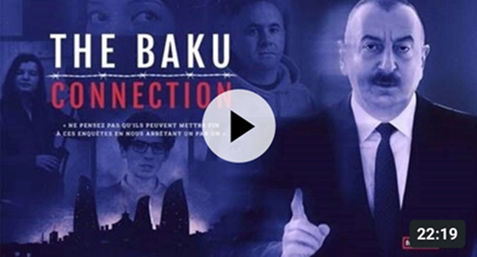
This is a failure with a face. During her five years in office since 2019 Secretary General Marija Pejinovic-Buric, the former Croatian foreign minister, repeatedly praised the Aliyev regime for non-existent progress and helped to whitewash the suppression of all independent media.
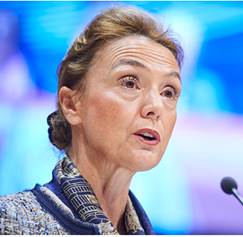
Marija (Secretary General) – whitewashing Aliyev
On 5 April 2022, General Secretary Marija travels to Baku. A repressive new media law has just entered into force. The government in Baku continues to block the publication of the most recent (2020) report by the Council of Europe Committee for Prevention of Torture. At the time she arrives, there are 125 political prisoners.
Marija acts as if she is unaware of all of this. She comes to Baku to present a new four-year Human Rights Action Plan. The new Action Plan has been prepared by her staff, including the office of the Council of Europe in Baku, in cooperation with the authorities in Baku. A budget of “€ 9.6 million” will be raised by the Council of Europe.
At the outset, the new Plan lists what two previous Action Plans have achieved. It is a surreal read. While Reporters without borders notes that “President Ilham Aliyev has wiped out any semblance of pluralism, and since 2014, has sought ruthlessly to silence any remaining critics” the Action Plan highlights only achievements. Since 2014, these include:
“250 journalists from different regions of Azerbaijan were trained in freedom of expression and the right to privacy offline and online.”
While Reporters without Borders writes that …
“Virtually the entire media sector is under official control … No independent television or radio is transmitted from within the country, and all print newspapers with a critical stance have been shut down.”
… the Action Plan promises a “multi-stakeholder dialogue on how to improve the national legislation on defamation and journalistic practice.”
It gets worse. The Action Plan refers only in passing to the implementation of judgements by the European Court of Human Rights. Instead, it celebrates “trainings” as “achievements”:
“Training of legal professionals was one of the priorities under the previous Action Plans for Azerbaijan 2014-2017 and 2018- 2021 … in total 533 legal professionals (74% men and 26% women) increased their knowledge of European human rights standards in different regions of Azerbaijan.”
What really matters is not mentioned. After all, Marija’s secretariat regularly publishes country factsheets on the implementation of ECtHR judgements. In mid-2021, while the new Action Plan is being put together, Azerbaijan came dead last – behind even Russia – in its implementation of ECtHR judgements.
All ECtHR cases closed until 19 April 2021
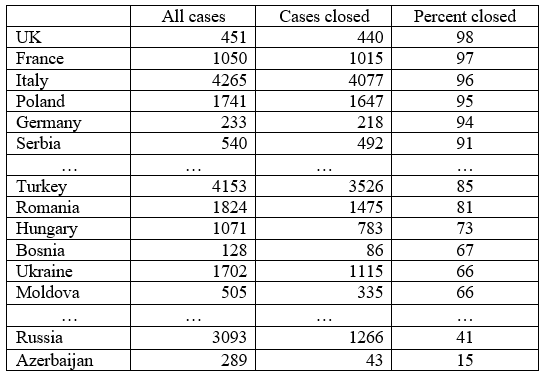
Baku’s record concerning those ECtHR cases which the Committee of Ministers considers particularly important - priority cases under a so-called “enhanced supervision” – is just as bad. While most Council of Europe members try to close such priority cases as quickly as possible –15 countries had no priority cases open then, 36 countries five or less – Azerbaijan had closed just one priority case of 19 (!) since it joined the Council of Europe in 2001.
And yet, in her Baku speech in April 2022, Marija declares instead: “On the rule of law, there has been important progress too.” And the Action Plan writes: “Since 2014 technical co-operation has led to improvements in the efficiency of the Azerbaijani courts and the quality of judicial services.” Black is white.
On 21 April 2022, a few days after Marija leaves Baku, four masked men abduct well-known human rights activist Bakhtiyar, and beat and torture him. In July 2023, Gubad is arrested and imprisoned. On 20 September 2023, the European Court of Human Rights orders Azerbaijan to transfer him to a hospital if needed, an interim measure based on “an imminent risk of irreparable damage” and “threat to life.” Azerbaijan ignores the Court, again.
On 1 December 2023, the Institute for Peace and Democracy publishes an updated list of political prisoners: 254 in total. On 8 December, only six weeks after the expulsion of almost the whole Armenian population from Nagorno-Karabakh, Marija comes to Baku again. She meets President Aliyev. The website of the Azeri Presidency writes about the meeting:
“The Secretary General of the Council of Europe commended the reforms implemented in Azerbaijan under the leadership of President Ilham Aliyev”.
The very day Marija praises Azerbaijan’s “reforms”, on 8 December 2023, new charges are launched against Bakhtiyar. On 14 December, the prominent opposition politician Tofik is detained. On 13 January 2024, Elnara, the next Abzas journalist is arrested. A few weeks after the General Secretary’s visit, the Azerbaijani delegation is kicked out of PACE.
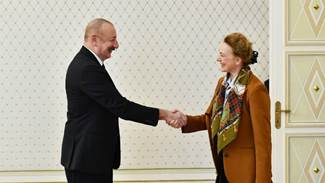
Ilham Aliyev and Marija Pecjinovic Buric in Baku, December 2023
… and member states are silent.
All PACE rapporteurs describe an autocracy with rapidly deteriorating human rights. The General Secretary sees a democracy making steady progress on the rule of law and in media freedom. And the Committee of Ministers remains silent and on the fence.

Ambassadors in the Committee of Ministers in Strasbourg
Article 3 of the Statute of the Council of Europe refers to the key notion of sincere collaboration in the realisation of fundamental freedoms in all Council of Europe member states:
“Every member of the Council of Europe must accept the principles of the rule of law and of the enjoyment by all persons within its jurisdiction of human rights and fundamental freedoms, and collaborate sincerely and effectively in the realisation of the aim of the Council …”
While the number of political prisoners in Azerbaijan is higher than ever, and rising, the Committee of Ministers has yet to respond to the sharp deterioration of human rights that led PACE to suspend the Azerbaijani delegation in January 2024. Or to react to repeated threats by the leadership of Azerbaijan to invade Armenia, another Council of Europe member.
Breaking the silence
To break its silence, the Committee of Ministers might turn to the wisdom of the Council of Europe’s founders, recall the fate of the League of Nations, and remember lessons from its own disastrous failure confronting Putin’s Russia. And send two strong and simple messages:
- There can be no political prisoners in any Council of Europe member state.
Article 8, last evoked for Russia, spells out the consequences of continuous serious violation of core principles:
“Any member of the Council of Europe which has seriously violated Article 3 may be suspended from its rights of representation and requested by the Committee of Ministers to withdraw under Article 7. If such member does not comply with this request, the Committee may decide that it has ceased to be a member of the Council as from such date as the Committee may determine.”
To imprison people for political reasons if clearly the most serious violation of Article 3. To remain a full member of the Council of Europe, Azerbaijan must release its political prisoners. If it does not do so, the Committee of Ministers should follow the lead of PACE and suspend Azerbaijan’s membership, based on Article 8 of the Statutes, before August 2024. If it does so, however, PACE may restore the credentials of the Azerbaijani delegation again.
- There must be no wars of aggression against another Council of Europe member state.
The message from Russia’s expulsion in early 2022 is clear: No member state of the Council of Europe must wage a war of aggression against another member. If that happens, the aggressor will be expelled immediately. The Committee of Ministers should state this clearly, as a general principle, before it is too late again.
The sobering lesson from Russia in the years before 2022 is that in the end, the only way to keep a country in the Council of Europe is not by closing one’s eyes and sacrificing all standards but by insisting, in time, that the country abides by the Council’s standards or leaves. This is the way both to promote human rights and to increase the chance of international peace and security.
Is it already too late in the case of Aliyev’s Azerbaijan? It is certainly not too late to try to find out, as a lot depends on it, including whether the Council of Europe can recover its soul on its 75th anniversary.
Audere vincere (Dare to win) and happy birthday!
Your sincerely,

Gerald Knaus
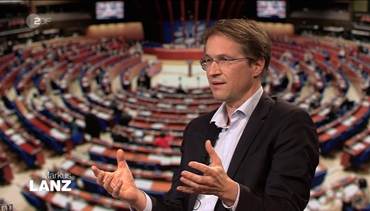
On the future of the Council of Europe (ZDF)
Recommended reading
NEW: ESI background: The next war in the Caucasus – Taking Ilham Aliyev seriously
ESI newsletter: Seven Baku rules – When Aliyev’s MPs were shown the door (7 February 2024)
ESI background: Seven Baku rules – How (not) to have elections (7 February 2024)
ESI background: When Aliyev’s MPs were shown the door – A historic PACE debate (24 January 2024)
ESI newsletter: 47 again? Russia out, Kosovo in, 16 May 2022
ESI Newsletter: Expelling Oceania – The Council of Europe and Russian aggression (9 March 2022)
ESI Newsletter: Suspend Russia! The Council of Europe and the new cold war (23 February 2022)
ESI newsletter: The strangest love affair – autocrats and parliamentarians, from Berlin to Strasbourg (2 April 2021)
Frankfurter Allgemeine Zeitung: “The Azerbaijan clique: A general atmosphere of venality” – Interview with Gerald Knaus (English translation) (30 March 2021)

